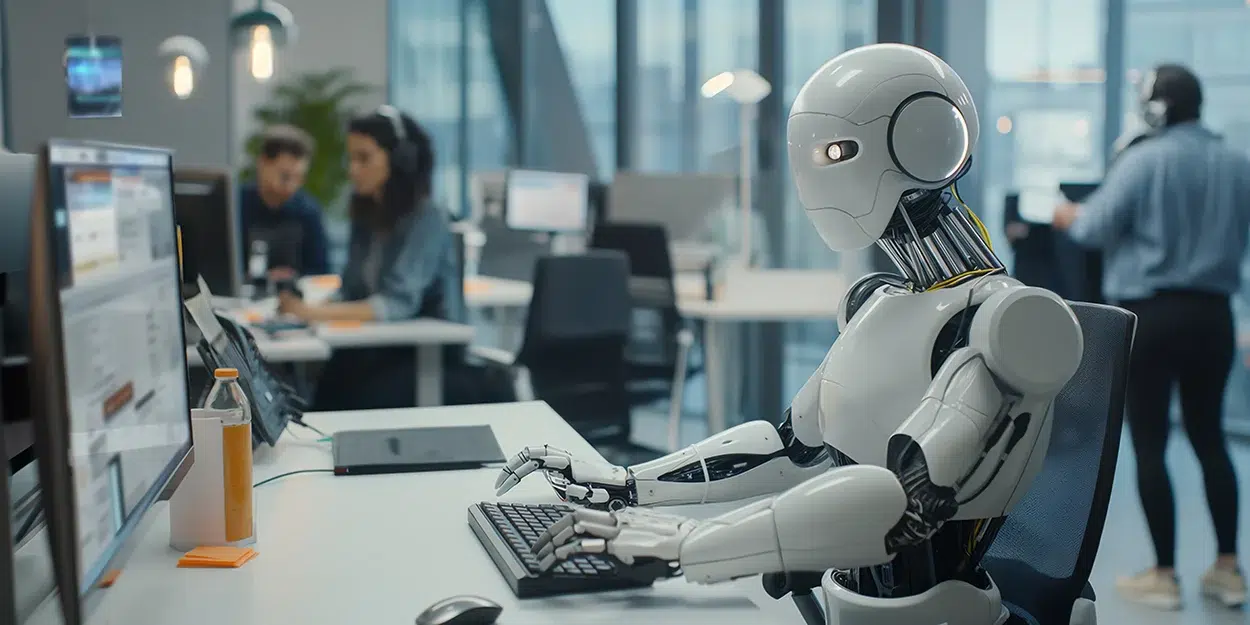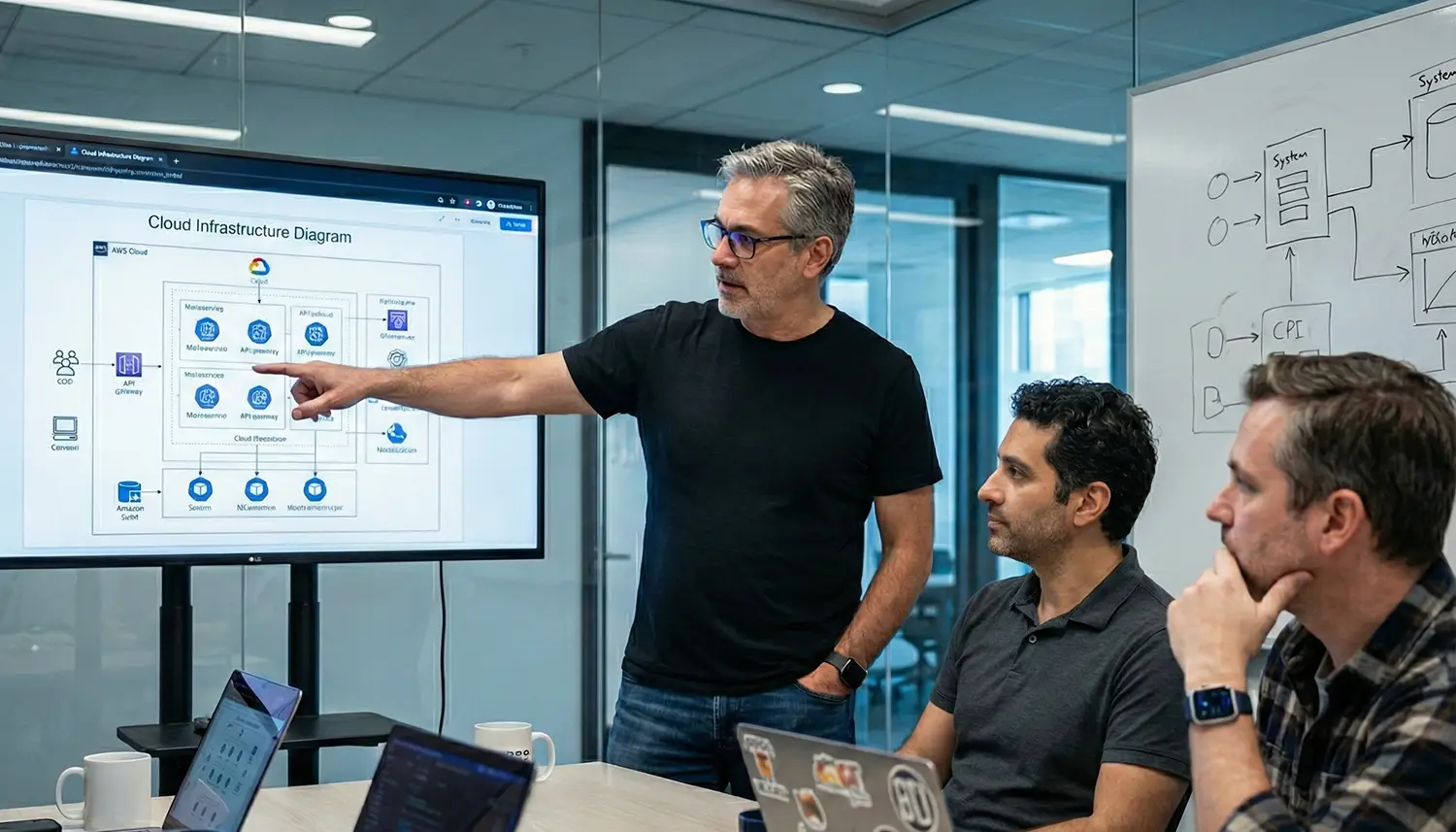Artificial intelligence (AI) has existed for centuries, but its popularity soared in 2022 when over a million users joined OpenAI ChatGPT within five days. Today, thousands of AI are impacting business processes, and software development is no exception.
Rather than spending tons of hours on coding, many web developers now leverage AI to automate code writing and documentation, project research, and debugging. As a result, 80% of developers claimed that having an AI-integrated workflow has increased their productivity.
Nevertheless, there’s more to expect in the coming years as AI transforms how developers approach software development. In this article, we’ll explore the current AI landscape in web development, examine emerging trends, and discuss how you should position your business and products for increased efficiency.
AI in Web Development
It’s no longer news that AI has revolutionized the traditional web development workflow to spark efficiency and innovation. To understand the specificity of its impact, let’s take a look at the different affected areas below:
1. Automated Coding and Website Creation
Code writing is one of the major aspects of web development that AI influences, with 82% of developers using AI to automate the process. Also, traditional code-writing platforms like GitHub have integrated AI functionality into their system to aid developer efficiency. The benefit of this change is that developers will now have more time to concentrate on creative, innovative, and complex tasks that require human intervention.
Likewise, with AI-powered drag-and-drop website builders like Wix, Adobe, and Squarespace, website design may be achieved in less time than the traditional process.
2. AI-Powered Design and User Experience
Website design has also received a noticeable advancement from artificial design intelligence (ADI), which streamlines the creation process. As a result, both developers and non-technical users can quickly generate websites with professional layouts, responsive designs, and personalized user experiences.
With machine learning algorithms and language models, AI can automate users’ data collection, identify changing patterns in human behaviors, and suggest designs or content to enhance user experience.
3. Personalization and Customization Through AI
Because personalization has been critical to users and businesses, its AI-based approach is expected to grow at a CAGR of 4.7% by 2033 from USD 498.2 Billion in 2023. So, rather than relying on manual processes of surveying users to understand their preferences, AI algorithms monitor users’ activities, navigation, and most visited website categories to offer personalized content and experience to them.
An example is when eCommerce websites target different locations with different products and payment methods and show users region-specific content or content based on their purchase history.
4. Integration of AI Into Web Development Tools
No sooner had AI become popular than many existing web development tools found reasons to integrate AI into their features. Today, hundreds of AI tools have been integrated into web development processes. Some popular ones include Snyk, Applitools, Adobe Sensei, and GitHub Copilot. A recent GAP survey revealed that GitHub Copilot’s functionality improves developers’ productivity and helps them complete projects faster.
Considering how these tools simplify repetitive development tasks, junior software developers who understand AI integration in web development can function beyond their current experience.
AI in Applications
Users expect a more personalized experience and high performance in their mobile apps than websites. Thanks to AI technology, developers can now access automated tools to offer the end users the best real-time experience. In this section, we’ll understand how AI is changing application development.
1. AI-Powered Chatbots and Virtual Assistants
As AI integration reduces developers’ workload, users’ engagement with mobile applications keeps improving. A good example is how AI-powered chatbots continually engage application users to support them with inquiries or troubleshooting. And with the increased rate of mobile app usage across different sectors, it’s high time businesses invested in AI-powered chatbot solutions and virtual assistants to stay relevant in this market share.
This, in return, empowers businesses to offer satisfactory customer experience with 24/7 availability, which reduces the operational cost of hiring more customer support staff, and leads to a high retention rate of app users.
2. Intelligent Data Analysis and Decision-Making
Artificial intelligence is improving the rate at which developers access large data sets for valuable insights to make data-driven decisions regarding app users’ preferences. With the help of machine learning, AI gathers and analyzes data such as user behaviors, favorite content, usage time, and other trends to help developers offer high-end personalized experiences.
A good example is the AI in Google Analytics 4 for understanding audience behaviors for marketing purposes, leading to more targeted campaigns and revenue generation.
3. Predictive Analytics and Recommendations
Before now, businesses have been investing in market research, surveys, and demographic studies to continuously learn about customers’ preferences and how to tailor their solutions. This approach is time-consuming and isn’t agile enough to provide real-time support to the ever-growing needs of users.
Thanks to AI, which evaluates users’ interaction with applications to predict future behaviors. This empowers businesses to provide tailored solutions and recommendations that improve the users’ overall experience. An example is the Amazon e-commerce app, which suggests products under categories like “Products related to this item” or “Frequently bought together” based on individual user behaviors.
4. Cross-Platform Development
The traditional application development approach is expected to take 4-6 months before completion. However, AI is changing the game, providing access to low-code or no-code app makers to streamline the app development process.
Likewise, developers can create a single codebase that runs seamlessly across multiple devices and operating systems with the help of AI-powered tools in frameworks like FlutterFlow and React Native. In the long run, developers can work happily and focus on more meaningful work, similar to the experience of developers who integrated AI into their workflow in McKinsey’s study.
Challenges and Limitations of AI-Inclusion in Software Development
While businesses benefit from the increased conversion rates, developers benefit from the speed at which projects are completed, and users enjoy an exceptional web and app experience with the power of AI, some challenges remain:
1. Ethical Considerations of AI in Web Development and Applications
As AI takes partnership in handling critical data, it’s important to understand its data-handling approaches. Many developers are concerned with trusting these third-party tools with sensitive data as there is insufficient data to support its accuracy, bias, data privacy, protection, security, accountability, and reliability.
2. Potential Job Displacement and Workforce Changes
Now, the most popular concern among developers as AI adaptation in software grows is whether AI will replace developers. While it is becoming obvious that AI cannot replace developers because of its inability to contextualize project situations based on organizational goals and think exactly like humans, the reality of reduction in manual human labor is still a major concern.
3. Data Privacy and Security Concerns
Considering the cost and growth rate of cyber threats, relying on a third-party tool that can access developers’ code data and, in some cases, may require running a specific software on developers’ laptops is risky.
As a result, balancing data privacy and security with relying on AI for accurate data analysis is a major concern for developers and businesses. Therefore, it’s critical to stick to best practices when using AI.
4. Limitations of Current AI Technology
AI is still evolving, and its best is yet to come. While AI has been resourceful at automating repetitive activities, several limitations remain. Current AI systems cannot think exactly as humans do, struggle to contextualize broader project goals beyond code writing, lack creativity and emotional intelligence, and remain vulnerable to cyberattacks. These limitations represent significant gaps in AI capability, and their resolution will shape AI’s growth in the future.
5. Impact on Accessibility and Inclusivity
Some notable areas of concern where AI may impact accessibility and inclusivity include algorithmic unreliability, which may lead to discriminating certain content and its limitations in understanding human emotions.
Future of AI in Web Development and Applications
The future of web development with AI is beaming, particularly with its current success rate, challenges, and how it will shape developers’ workflow.
1. Emerging Trends and Advancements in AI Technology
AI’s emergence has led to continuous advancements in technology across different industries. Some emerging technological advancements that AI facilitates include computer vision, reinforcement learning, and natural language processing. Others include ethical AI, increased need for AI and machine learning experts, shadow AI, collaboration of humans and bots, and AI democratization.
2. Potential Impact on Industries and Businesses
Considering the current impact of AI in many industries, AI is forecasted to be pivotal in improving employees’ efficiency and productivity. This transformation is also expected to bring more exciting business opportunities and increase revenue generation.
3. Implications for Web Developers and Designers
Contrary to the popular assumptions that AI will replace developers, the emergence of AI is more likely to open more job opportunities for developers. This is because, for example, code reviewing and other human intelligence-centered tasks become more important as the world becomes more reliant on AI-generated code. Likewise, junior developers can scale their expertise as AI offers them senior skillset assistance in code generation.
Preparing for the Future of Artificial Intelligence in Web Development
Now, the question: How are you adapting your software development team and organization to AI transformation?
It’s now more obvious that human expertise is still a stronger requirement even as software development becomes intertwined with AI. This is the best time to equip your organization with the most relevant skills to maximize AI-powered solutions. Keeping up with AI trends and strategies may be daunting, but considering the technicalities, you don’t have to do it yourself.
At GAP, we have worked with many clients across different fields, sharing our expertise in the digital life cycle of AI projects, from prototype proofs of concepts to production applications to pipeline maintenance for AI models. We’d also love to work with your team to set up your software team and future-proof your process for AI. Contact us today, and we’ll answer your questions.



